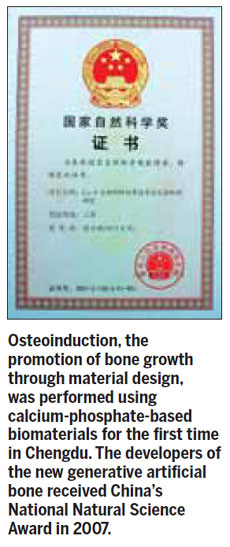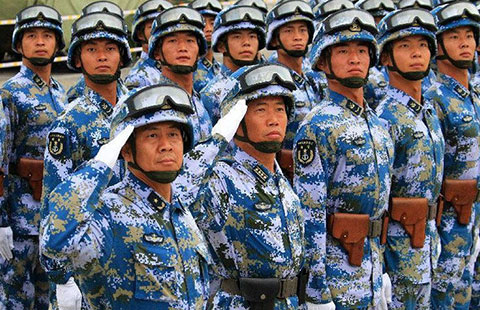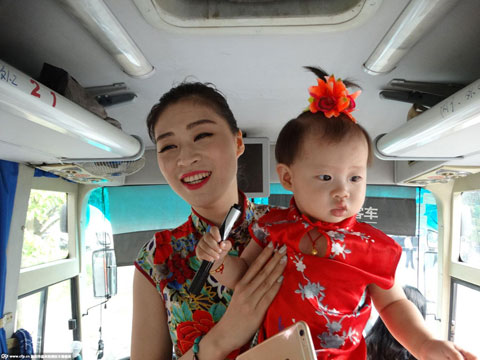

|
The Chengdu Puchuan Biomaterials Co is a modern enterprise of advanced biomaterials and medical implants in China. Photos Provided to China Daily |
|
Clockwise are products made by Chengdu Puchuan: Collagen. Transplanted teeth. An artificial joint. Artificial bones. |

Chengdu in Southwest China's Sichuan province is taking a lead in the world's emerging biomaterials industry as evidenced by its selection to host the ninth World Biomaterials Congress, which concluded earlier this month.
Contemporary biomaterial was first put into use in the 1940s, but it had not evolved into an independent discipline until early 1980s. With the efforts of Professors Yue Yilun and Kang Zhenhuang, Sichuan University pioneered in the biomaterials research in 1970s.
Thanks to the unremitting efforts made by the biomaterials scientists at Sichuan University and other research institutes, Chengdu has become a center of the field, which involves the research and development of new materials that can diagnose, repair or replace human tissues or organs.
In 1990, the academic degree committee of the State Council gave Sichuan University approval to establish two committees to award doctoral degrees in biomechanics and biomedical engineering.
By 1999, biomedical engineering was approved as an undergraduate program by the Ministry of Education.
The university has the distinction of being the first in the world to use calcium-phosphate-based biomaterials for osteoinduction, which can promote the regeneration of new bones.
At the same time, the biomaterials-related Key Laboratory of the Education Ministry was established in Southwest Jiaotong University in Chengdu to enroll undergraduate and graduate students majoring in biomaterials science.
Southwest Jiaotong University leads the world in improving the anticoagulant properties surface-modified titanium alloy, a metal used in cardiovascular repair materials.
In 2004, the city established the National Engineering Research Center for Biomaterials, the nation's first research and development institute of biomedical materials.
The first national-level biomedical materials and products test and appraisal center in central and western China was set up in the city in 2004.
Also in the same year, a national biomedical nanomaterials incubator base approved by the Ministry of Science and Technology was built in the city too.
In 2009, a national international scientific and technological research base was given the green light to be established in Chengdu.
Along with the rapid development of research, the sale of biomaterials in Chengdu is also taking off.
By 2015, bone and tooth implantation devices sales are expected to reach about 1.5 billion yuan ($235 million). Revenues generated by blood-purification materials and equipment will hit about 800 million yuan, while sales of modified artificial heart valves and vascular scaffolds will reach about 800 million yuan.
By that time, the total sales of medical polyurethane, silicone rubber, catheters, condoms and other polymeric medical materials will hit 800 million yuan. Also, 500 million yuan of degradable polymer and materials for cartilage repair will be sold, while drug-controlled release and other biological materials and devices are expected to account for 500 to 800 million yuan.
City's giant growth
Thanks to Chengdu's potential in biomaterials, the world is paying an increasing amount of attention to this city.
The first international dental implant conference was held in Chengdu as early as 1987. The Asian Biomaterials Congress, held every two years, has been held in Chengdu several times.
Chengdu was the first Chinese city to host the ninth World Biomaterials Congress, a leading global conference, which concluded on June 5.
"When the world is looking at China, the third-largest biomaterials market, they will inevitably focus on Chengdu," said Zhang Xingdong, academician of the Chinese Academy of Engineering and professor at Sichuan University. He was also president of the ninth World Biomaterials Congress.
The congress, with the theme "Innovative Biomaterials and Crossing Frontiers in Biomaterials and Regenerative Medicine", highlighted discussions on the hottest biomaterials topics, including medical implants, artificial organs and tissue engineering.
It was a rare opportunity for the world's best minds in the field to get together and brainstorm, organizers of the congress said.
Over the course of the five-day congress, more than 3,000 experts, scholars and scientists, doctors, entrepreneurs and managers from 57 countries and regions took part in various meetings, plenary sessions, discussions and forums at the event.
Among the guests present, there were big names, including Nicolas Peppas, chairman of International Union of Societies for Biomaterials Sciences and Engineering.
xuxiao@chinadaily.com.cn
(China Daily 06/20/2012 page15)









